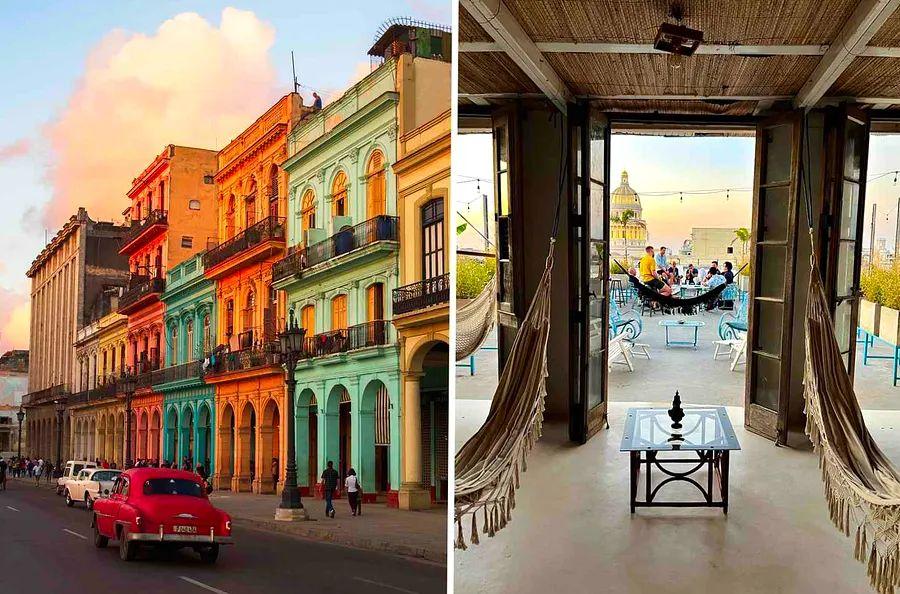I’ve just returned from a well-known island nation that has rapidly become the top LGBTQ destination in the Caribbean.

 Left: A quintessential scene from Havana; cocktail time in the city featuring Verano Forever Travel.
Photo credit: Left: Brandon Rosenblum/Getty Images; Courtesy of Verano Forever Travel
Left: A quintessential scene from Havana; cocktail time in the city featuring Verano Forever Travel.
Photo credit: Left: Brandon Rosenblum/Getty Images; Courtesy of Verano Forever TravelOne late night in Havana, the vibrant queer party El Divino de Cuba was in full swing. Attendees, all elegantly dressed, were making their way to the stage to honor a drag queen with dramatic beso kisses on both cheeks, clutching a handful of pesos tucked into her faux cleavage.
Honestly, Cuba had never ranked high on my travel list. Friends warned me about the lackluster food and a nonexistent LGBTQ scene. Yet, when I finally set foot on the island with 12 other gay men for an educational tour organized by Verano Forever Travel, we discovered a place brimming with delicious cuisine and lively parties featuring talented drag queens.
This highlights the significant changes that have occurred in recent years, as Carlos Gonzalez, founder of Travel the Artist Way and one of our guides for the week, explained. He noted that two decades ago, gatherings like El Divino would have been held in secrecy to evade police crackdowns.
Nowadays, El Divino boasts an Instagram presence, and LGBTQ Cubans can now legally marry, adopt children, and receive free gender-affirming care. Instead of deporting LGBTQ foreigners—like Fidel Castro once did to American poet Allen Ginsberg—the government now operates two hotels specifically catering to queer travelers.
The nation's challenges are also fueling transformation. In 2021, Cuba witnessed some of its largest protests since the revolution, spurred by ongoing economic struggles. In response, the government eased restrictions on private businesses, resulting in an increase in bars, clubs, and small enterprises, as explained by Alejandro Almaguer, the founder of Verano.
LGBTQ bars in Havana, such as PaZillo and XY, frequently host queer parties that go into the early hours. There are also mixed venues like King Bar, where a saxophonist was seen leaping onto tabletops, jamming along with the DJ's salsa beats on a bustling Friday night.
However, our focus wasn’t solely on nightlife. One afternoon, we enjoyed an exclusive viewing of works by Alejandro Cañer, an emerging queer digital artist. "You won’t find his art in official galleries here," Gonzalez informed us. As we entered the pop-up in a modest studio within a residential building, it became clear why.
"I’d label my work as sexually deviant propaganda," Cañer remarked while I admired a piece featuring a flexing Che Guevara clad in a harlequin-print thong. "I enjoy twisting my country’s history, playing with its symbols and concepts, and making it scandalous," he added.
We also ventured beyond Havana. In Viñales, our group enjoyed a brief horseback ride through the countryside before reaching a private tobacco farm, where we learned to craft fresh sugarcane juice and smoke cigars. Our lunch was a delightful farm-to-table spread at Restaurante El Cuajaní, featuring dishes like bruschetta and fresh pumpkin soup.
Towards the end of our week, Gonzalez treated us to a pig roast in the rural area outside Havana. With the ground still damp from rain, we danced barefoot in the mud with our hosts until a drag show began. During a Lady Gaga medley, a queen named Salma de Armas lifted me into the air—an impressive feat after indulging in all that pork, tostones, and yuca.
"Bring a sense of adventure with you," Gonzalez advised, "and you’re bound to have a great time."
Essential Information Before You Travel
U.S. citizens can legally travel to Cuba as long as they comply with authorized travel categories, such as "educational activities" and "support for the Cuban people," as outlined by the Department of the Treasury. Tours like those offered by Verano Forever Travel qualify, along with other organized programs that focus on cultural exchange.
Americans must also acquire a visa, which can be obtained from airlines or Cuba Travel Services, and fill out a digital form, D’Viajeros, within three days of arrival. They are prohibited from spending money at government-run venues; the Department of State provides a list of "restricted entities." U.S. credit cards generally do not function on the island, so it’s advisable to bring ample cash.
This story was originally published in the June 2024 issue of Dinogo with the title "The New Frontier."

1

2

3

4

5
Evaluation :
5/5